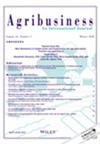Adoption of nontraditional governance characteristics in US farmer cooperatives
IF 2
3区 经济学
Q2 AGRICULTURAL ECONOMICS & POLICY
引用次数: 0
Abstract
Although the governance of farm producer‐owned and ‐controlled organizations is shaped by the complex interaction of mixed member, director, and manager objectives, its conceptualization in the literature is limited to the assignment of control to members, board directors, and managers. Such a categorization is imperfect as there exist other governance characteristics such as member vote distribution, board director identity, manager identity, and CEO identity. Using 371 survey responses from US farmer cooperatives, we inform the adoption of nontraditional governance characteristics in terms of proportional vote distribution, nonmember board directors (i.e., outside directors), and nonmember managers and CEOs. Furthermore, we relate the adoption of nontraditional characteristics to the competitive scope, organizational function, organizational size, and capital structure of the survey respondents by means of various empirical techniques. Generally, nontraditional adaptation of the governance structure, which implies an advanced delegation of control to decision specialists who are non‐members, is positively associated with the competitive scope and organizational size. Also, such nontraditional adaptation is more common to marketing cooperatives as compared to supply cooperatives. Our study motivates a multi‐dimensional conceptualization of governance, which is necessary to better understand the internal coordination of member and manager objectives. [EconLit Citations: Q13].美国农民合作社采用非传统治理特征
尽管农场生产者拥有和控制的组织的治理是由成员、董事和经理的混合目标的复杂互动所决定的,但文献中对其概念化的描述仅限于将控制权分配给成员、董事会董事和经理。这种分类并不完善,因为还存在其他治理特征,如成员投票权分配、董事会董事身份、经理身份和首席执行官身份。通过 371 份来自美国农民合作社的调查反馈,我们从投票比例分配、非成员董事会董事(即外部董事)、非成员经理和首席执行官等方面了解了非传统治理特征的采用情况。此外,我们还通过各种实证技术将非传统特征的采用与调查对象的竞争范围、组织职能、组织规模和资本结构联系起来。一般来说,治理结构的非传统适应意味着将控制权提前下放给非成员的决策专家,这与竞争范围和组织规模呈正相关。此外,与供应合作社相比,这种非传统的调整在营销合作社中更为常见。我们的研究促使我们对治理进行多维度的概念化,这对于更好地理解成员和管理者目标的内部协调非常必要。[经济学引文:问题 13]。
本文章由计算机程序翻译,如有差异,请以英文原文为准。
求助全文
约1分钟内获得全文
求助全文
来源期刊

Agribusiness
农林科学-食品科技
CiteScore
5.50
自引率
6.20%
发文量
58
审稿时长
6 months
期刊介绍:
Agribusiness: An International Journal publishes research that improves our understanding of how food systems work, how they are evolving, and how public and/or private actions affect the performance of the global agro-industrial complex. The journal focuses on the application of economic analysis to the organization and performance of firms and markets in industrial food systems. Subject matter areas include supply and demand analysis, industrial organization analysis, price and trade analysis, marketing, finance, and public policy analysis. International, cross-country comparative, and within-country studies are welcome. To facilitate research the journal’s Forum section, on an intermittent basis, offers commentary and reports on business policy issues.
 求助内容:
求助内容: 应助结果提醒方式:
应助结果提醒方式:


